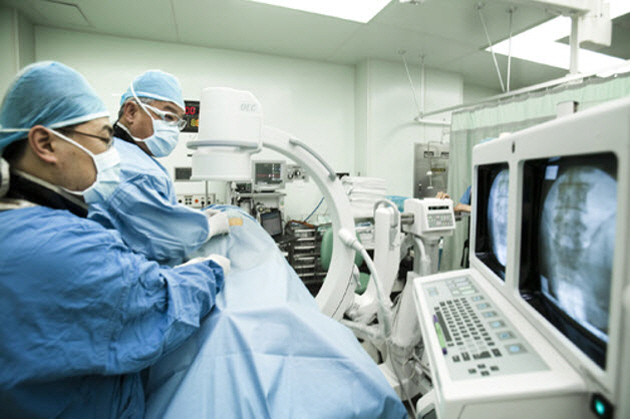
Professor LEE Sang Chul is treating a patient suffering from spinal disk herniation
Professor LEE Sang Chul and his team (Department of Anesthesiology and Pain Medicine of SNU Hospital) has found foraminotomy, a procedure used to relieve pressure on the nerves in the vertebrae, as an effective method of treatment for patients suffering from spine diseases such as spinal stenosis and spinal disk herniation.
The effective treatment employs a local anesthetic on the patient and inserts a special kit between the vertebrae that removes inflammation and disk material to provide more space for the passing nerve bundles. The treatment lasts only 15 minutes and patients are able to immediately return to their daily activities. Spine disorders such as spinal stenosis result in pain due to the compression of the nerves between the vertebrae and the resulting inflammation. There are many potential causes behind the disorder, which include aging ligaments and trauma to the spine. Previously, only patients suffering from spinal stenosis were considered for foraminotomy, however, Professor Lee’s findings show that the treatment can be expanded to patients suffering from spinal disk herniation.
Over a period of two to three months, Professor Lee’s team observed 67 patients suffering from spine diseases after conducting the new treatment procedure. The patients observed had previously undertaken other methods of non-invasive treatment and 8 patients had even undergone surgery; however, despite the prior treatments, they all still reported pain. With the new treatment, the majority of the patients have noticed a decrease in their levels of pain. 49 patients, or 73% of the overall observed group, claim that they have experienced a noticeable amount of pain relief, while 30 of those patients reported to have a significant amount of pain relief.
The effectiveness and the low risk side effects make the treatment procedure available as an option for the elderly and patients who have severe limitations in their treatment options due to chronic diseases such as diabetes. Spine related disorders and diseases have been on the rise in Korea and according to reports in 2012 from the National Health Insurance Service, there were 1.14 million patients diagnosed with spinal stenosis. The Seoul National University Hospital’s Pain Management Center reports that it will conduct further observation and analysis of data to ensure the treatment’s efficacy and safety.
Written by Yun Hwan Chae, SNU English Editor, yunhwanchae@snu.ac.kr
Reviewed by Eli Park Sorensen, SNU Professor of Liberal Studies, eps7257@snu.ac.kr

